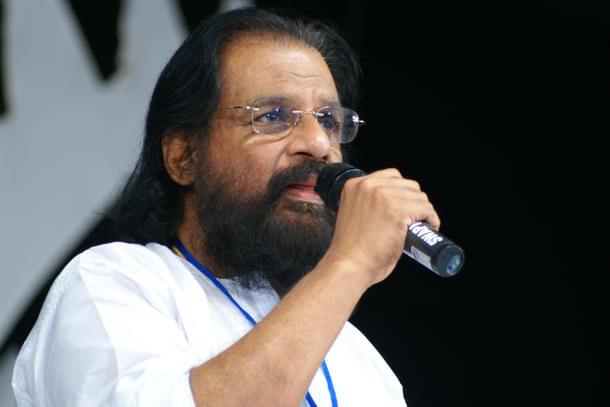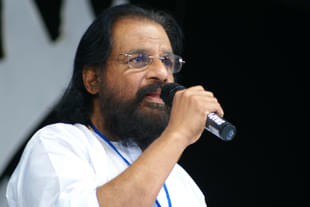Culture
We Bet Many Of These K J Yesudas' Hindi Songs You Haven’t Heard Before
K Balakumar
Jan 10, 2025, 04:56 PM | Updated Jan 17, 2025, 03:09 PM IST
Save & read from anywhere!
Bookmark stories for easy access on any device or the Swarajya app.


A few months ago, a friend sent me audio links to two of K J Yesudas' Hindi songs that I had not heard before.
Now, I have been as avid a follower of the great man's career as any since the mid-1980s. Yet, even I hadn’t come across these songs before.
What’s more, they were tuned by South Indian music maestros Devarajan and M S Viswanathan. These two music stalwarts had not formally ventured into Bollywood. Their contributions to Hindi cinema were usually through the dubbing route.
A bit of research online revealed that the two songs were indeed remakes from Malayalam and Tamil films, respectively. They were the Hindi versions of Itha Ivide Vare (1977) and Dharmam Engey (1972), released as Pratishodh (1980) and Baghi Lutera (1975) in Hindi. Even on YouTube, where rare gems often surface, there were only links to the Pratishodh song Pyar Do Pyar Do.
Even this song was incorrectly credited to Ravindra Jain, under whose baton Yesudas sang most of his over 200 Hindi film songs. The Baghi Lutera song has no trace on the web, at least as far as I could search. This seems to be the fate of many of his Hindi songs, the majority of which were recorded in the late 1970s and 1980s. This is somewhat unfair to the first pan-Indian film phenomenon.
A Plethora of Songs in Unreleased Movies
Yesudas' popular kickoff in Hindi began with the iconic Chhoti Si Baat (1976), followed by the even more splendid Chitchor (1976), which earned him a National Award — the third of his eight awards in a career spanning over six decades.
We won't delve into his other chart-toppers like Surmai Akhiyon, Maano Ho Tum, Koi Gaata Mein So Jaata, Zid Na Karo, and others on this crowd-pleaser list.
Yesudas made his Hindi debut as early as 1971. His earliest Hindi songs, however, were in films that either weren’t released or are largely forgotten. For instance, his first Hindi song is said to be in the film Jai Jawan Jai Kisaan (1971). The song Dilruba Kya Hua, composed by the little-known A A Raaj, was in the typical Mohammed Rafi style, of whom Yesudas remains a lifelong fan.
Another unreleased film featuring his gems is Anand Mahal (1977). The songs of Anand Mahal are relatively better known among music aficionados. Who can forget the classically rich Ni Sa Ga Ma Pa Ni, which showcased Yesudas' versatility in Hindustani music as well?
Similarly, his classical hits from the unreleased Tansen (1970) were a veritable musical tour de force, including the ragamalika Shadaj Ne Paya Yeh Vardan. This 13-minute song is, in a sense, a spiritual precursor to the Malayalam hit Devasabhaathalam from His Highness Abdullah (1990), which later cemented Yesudas' place among the pantheon of Indian musical greats.
While Tansen and Anand Mahal were part of films that didn’t make it to the screens, there's also the Salil Chowdhury beauty Gaa Man Mera Gaa, which isn’t credited to any movie at all. Fortunately, it has a Malayalam counterpart in Maane Maane Vili Kelkku from Swapnam (1973).
Among his unreleased charmers is a ghazal by Khayyam, Yeh Haseen Raat. This ethereal duet with Lata Mangeshkar was to feature in the Rajesh Khanna-Rakhee starrer Majnoon (1979), which was shelved due to financial constraints.
Yesudas, Jagjit, and Jalota
Another duet with Lata, Donon Ke Dil Hai, was in another unreleased film, Bin Baap Ka Beta (1979).
Interestingly, the same song, sung by Lata and Jagjit Singh, featured in a later film, Nargis (1982), which also didn’t make it to the cinemas.
Listen to both versions and notice the difference between Yesudas and Jagjit. The musical heft in Yesudas' voice, as they say, is on another level.
In the 1989 film Pyar Ka Sawan, Yesudas is pitted alongside Anup Jalota. The song Do Matware Sarayu Kinare seems like a typical climax clash song.
The film also features the Darbari Kanada-based duet Jo Baithe Charano Mein, with Yesudas and Jalota. Yesudas' delivery of the classical musical phrases is the most notable aspect of this enduring beauty.
Speaking of Jalota and Yesudas, the film Chintamani Surdas (1988) has Jalota lip-syncing to the classical number Mero Man Anat Kahan, sung by Yesudas. Is there another instance where an established singer merely acts while the voice is another’s?
With a strong, well-chiselled voice, Yesudas was often sought for songs tinged with classicism. Teri Chanchal Chanchal Aankhon Mein in Meera Ka Mohan (1992) and Ram Rahim Mein Antar Nahin in Alag Alag (1985) are typical examples, showing why he was the go-to man for music directors like Arun Paudwal and R D Burman.
Filled with Classical Heft
These classical-type songs further enhanced his stature in the industry. Hey Narayana in Kariye Kshama (1985), composed by Ravindra Jain, is a prime example.
In Madhuri Dixit's Hindi debut Abodh (1984), Saamb Sadha Shiv deserved the vintage voice of Yesudas, and Jain relied on his trusted muse.
In Gopaal Krishna (1979), Yesudas sang Nir Bharan Ka Karke Bahana, a duet with Hemlata, with whom he recorded the most Hindi songs. Their popularity led to a non-film song commissioned by Doordarshan, Tista Nadi Si Tu.
Ravindra Jain never tired of Yesudas. In Mohini (1995), he included the unheralded classic Virah Dasha Meri, a duet with Alka Yagnik. Yesudas, as ever, was on pitch and note.
Jain also used Yesudas' voice for songs with rural emotions, such as the Bengali tribal-type Lal Gulaabi Phoolon Se in Hamara Sansar (1978).
Another intriguing classical number, Dekho Saajan Churaye Hai Mann from Hazaar Haath (1978), showcases Yesudas' mastery, despite the female singer, Sharda, struggling to keep up.
Aside from Jain and Salil Chowdhury, Yesudas' most enduring Bollywood partnership was with Bappi Lahiri. Their memorable Shyam Rang Ranga Re from Apne Paraye (1980) is a standout.
Even in 2006, when Yesudas was past his prime, he delivered the hymnal Treta Mein Ram Hue in Radha Ne Maala Japi Shyam Ki.
It was not just old-school classically minded baton wielders who were enamoured of the great man's voice. Even middle-of-the-road ones like Anand-Milind preferred him, such as when the duo re-tweaked A R Rahman's Tamil hit Poraale Ponnuthayi in Hindi as the lullabyish Palkon Pe Chalte Chalte in the intriguing Daayraa (1996). You can listen to them all day and not feel bored. Simple and satisfying.
Yesudas and Salil da: A Partnership for the Ages
In the late 1960s and 1970s, Salil Chowdhury used Manna Dey in Malayalam and Yesudas in Bengali with great flair. When Yesudas and Manna Dey rendered the duet Kaali Nagan Dasegi in Ayaash (1982), it garnered significant interest, being set to tune by Ravindra Jain.
The list of Yesudas' songs is extensive, but his collaborations with Chowdhury are among the best in Indian film music history. Chowdhury's penchant for recycling tunes across languages meant that Madaa Prave Va from Madanolsavam (1978) had a Hindi version, Pyar Mein Jo Bhi, sung by Yesudas. The tune was also reused in Kuhaasa (1978) as Jane Raaz Ye Kya.
Chowdhury's last Hindi venture, Swami Vivekananda (1998), featured Yesudas extensively. Despite the film’s delayed release, songs like Chalo Man Jayen and Nahi Surjo, Nahi Jyoti remain memorable. The simple beauty of Binaa Prem Dheeraj Nahi epitomises Yesudas.





